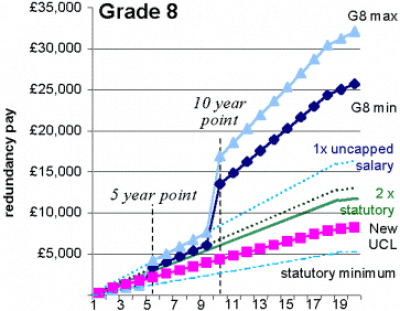This page details the dispute between UCL trade unions, including UCU, and UCL over changes to Enhanced Redundancy Pay (ERP).
UCL used three arguments to justify their actions.
They claimed that the Age Discrimination Regulations 2006 requires the change, that they do not accept that the scheme has contractual status (so they can change it as they wish) and that it is cost-neutral.
AGE DISCRIMINATION
They say they have made this change in the light of the Age Discrimination Regulations. Our legal advice (from Employment Tribunal law service, IDS) indicates that this is not necessary. Other institutions have not rushed to change their schemes.
Is there a legal requirement to change UCL's scheme?
The new legal issues apply to The Age Discrimination Act 2006 and in particular the clauses concerning long service benefits and enhanced redundancy schemes. The Act specifically permits long service enhancements and enhanced redundancy schemes like UCL's old scheme, provided
- that the same criteria are applied equally to all staff (e.g. to fixed term or part time staff as well as permanent full time staff) and
- they can be justified in terms of the business objectives (e.g. sustaining a community of 'knowledge workers').
Under pressure from the unions, in March 2007 UCL amended their scheme by offering the addition of a further 33% of annual salary to all staff who had accumulated 10 years' service. This partially redressed the balance in some cases. What this demonstrated was that UCL's lawyers believed that steps in the scheme were acceptable, something that UCL had previously denied. UCL continued to maintain that the law required the same statutory gradient throughout, however.
CONTRACTUAL STATUS
UCL claimed that the scheme was not part of staff's contractual terms and conditions. This, they said, permitted them to change the scheme without consulting staff or negotiating with the unions.
The unions disputed this, arguing that the scheme had been used, with minor changes, for 22 years and hundreds of cases and had thereby acquired contractual status. We have now won an important ruling from the Central Arbitration Committee, summarised below. Evidence presented is summarised here:
- We uncovered a University of London document from 1984 which describes the scheme as applied at that time. This scheme was inherited by UCL when it broke away from the University of London (they do not dispute this).
- This scheme was then varied in 1999 (to comply with legislation) and 2002 to extend the scheme to Contract Research Staff (as they were then called) and other fixed term staff. The scheme was detailed on our web pages from 2003 on.
UCL's case rested on their own claim that they did not tell members of staff about the scheme. It was therefore up to the unions to show that they were incorrect, and that the scheme was widely known and applied.
- The union case
- Enclosure A
- Enclosures B-E
- Enclosure F
- CAC Decision
The ruling had important implications.
Firstly, the CAC confirmed the trade unions' argument that UCL's ERP scheme pre October 2006 was a contractual right for all staff.
Secondly, the confirmation of this right limited UCL's ability to put pressure on higher paid and longer serving staff to accept Voluntary Severance. Reducing compulsory redundancy pay entitlements had given UCL managers greater leverage to pressure staff to take Voluntary Severance.
COST NEUTRALITY
UCL claimed that this change was cost-neutral. However long-serving and higher paid staff lost out financially.
An example of a Grade 8 member of staff leaving at age 40 in January is shown below (upper line: leaving at the top point on Grade 8; lower line: leaving at the bottom point).
Payments increase with years of service (horizontal axis).

The previous calculation (now restored) was that if you had worked at UCL for 5 or more years, you were entitled to enhanced redundancy pay as follows.
- The weekly pay limit is removed and the calculation is based on the full weekly pay.
- For 10 years of service or more, the total number of week's pay due is doubled.
Between 2 and 5 years service entitled the staff member to the statutory minimum.
This produces the stepped gradients shown in the graph above. Since the payment was also based on uncapped pay, the shortfall is easy to see.
A similar calculation is possible for other groups of staff.
Gains and losses
All staff, from Porters to Professors, would lose financially if they were in service for ten years. Staff on Grade 6 and above lost out if they have been in service for five. There was a small benefit for staff leaving between year 2 and year 5.
Staff below Grade 6 might also gain if they left before their tenth year of service, but they then lost out if they left with ten or more years of service. The cuts fall deepest on higher paid and long serving staff, some of whom stood to lose figures of £30,000 or more. We were aware of cases of individuals who had lost over £20,000.
On January 2007's figures:
- A 40 year old Grade 7 staff member on point 36 with 20 years service would lose over £16,000.
- A Grade 8 staff member of the same age on point 45 would lose over £23,000.
- The most any 40 year old staff member can gain with four years of service is £580.
MOTION PASSED AT GENERAL MEETING - 31 JAN 2007
This branch notes
- UCL's unilateral imposition of changes to the College Enhanced Redundancy Pay scheme.
- UCL's stated justification is the Age Discrimination Regulations 2006. Legal advice is that the legislation does not make necessary the legal changes imposed by UCL.
- UCL claims that the changes are 'cost-neutral'. There is therefore no reason to change them on grounds of cost.
- The college unions have not been negotiated or consulted with. UCL did not raise the redundancy scheme as part of its consultation on the Age Regulations. The scheme is an 'implied term' of employment and letters to staff used to state that they were entitled to the money under the scheme.
- All three trade unions, Unison, Amicus and UCU, have expressed forthright opposition to these changes and have written to the college seeking meaningful negotiations.
- These changes take place in the context of a College-wide Regeneration Plan which continues to lead to involuntary redundancies.
This branch believes
that the main effect of these cuts is to punish those who have given years of loyalty to UCL.
This branch resolves
- As a first step, members are urged not to accept any reduced redundancy payments.
- To demand a moratorium: that the old scheme is reinstated until a new one can be negotiated.
- That a new proposed scheme must be agreed by a union general meeting.
Proposed: UCL UCU Executive Committee. Passed unanimously.
Note
Industrial action has not been ruled out. The question will be considered in the light of current discussions with UCL at the next general meeting.
See also
UNITE (Amicus): Redundancy Pay Calculator (Excel)
 Close
Close


